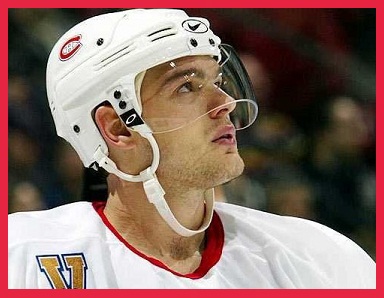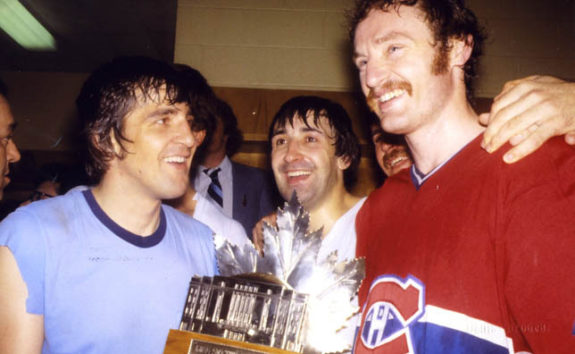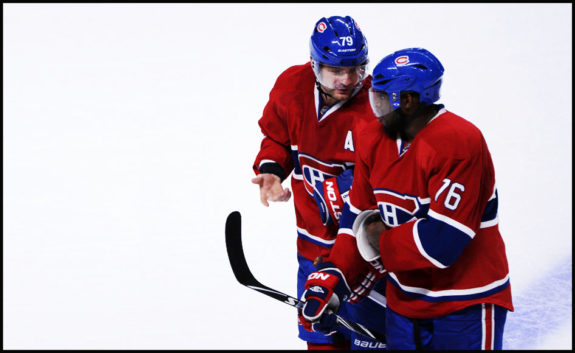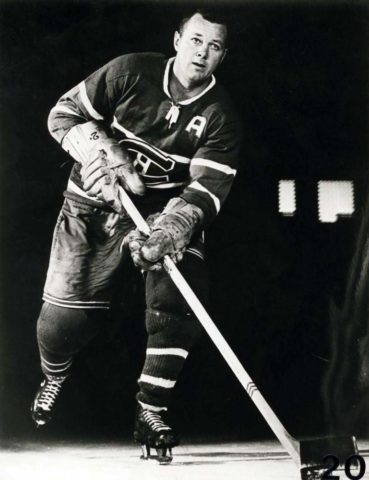After winning the Gagarin Cup with his KHL team, Ak Bars Kazan, Andrei Markov’s career with the Montreal Canadiens is officially over. Only a few months shy of his 40th birthday, a return to the Habs is not likely. There was a public outcry when he was not signed last year, but was this support consistent? Few fans disputed his skills as a player, but some downplayed his achievements because he did not hoist a Stanley Cup or win a Norris trophy. Others pointed out the number of games missed due to injury but failed to acknowledge his subsequent comeback.
Once dubbed the “Flying Frenchmen” for their goal-scoring prowess, the Canadiens have focused more on defense in recent years and many Habs’ rearguards are as much the focus of attention as their greatest scorers. So where do we place Markov? While he never became team captain, the quiet Russian’s leadership on and off the ice and his influence on younger players was unassailable, earning him the nickname “The General.” To fully appraise him, Markov must be evaluated in the context of his team and his era.
Markov’s Numbers Don’t Lie
A university study suggested that NHL defenseman perform close to or at their peak between the ages of 24 and 34. When Markov was cut by the blade of Carey Price’s skate in October 2009, it seemed to set off a chain of unfortunate injuries resulting in his absence for 181 regular season games over the next three seasons. To make matters worse, the NHL lockout pre-empted the beginning of the 2012-13 season where, after a resolution, a shortened 48-game schedule was played.

Essentially during the tail end of his peak years, Markov missed the equivalent of over two full seasons and could not contribute in a leading role to his team’s success. This was apparent when he was injured during the 2010-11 Stanley Cup playoffs and did not play against the Philadelphia Flyers in the Conference Final. A healthy Markov might have been the key to shutting down Jeff Carter, Claude Giroux, and Scott Hartnell.
Despite this, Markov is tied with Guy Lapointe for second place in career points among Canadiens’ defensemen and third in goals scored behind Lapointe and Larry Robinson. He accomplished this in an era when scoring declined by almost a goal a game compared to the period from 1985 to 1994. Overall he is 42nd among all defensemen in points, behind many who reached their peak during that high-scoring era.
Placing Markov Alongside the “Big Three”
Larry Robinson, Guy Lapointe and Serge Savard anchored the Canadiens’ defense for almost a decade in the 1970’s when the team won six Stanley Cups. Known as the “big three,” they accounted for a significant portion of the Habs’ offense while ensuring few pucks reached stellar goaltender Ken Dryden.

Like a good marriage, they also had each other, and when one faltered another could rise to the occasion to pick up the slack. They were part of a team bursting with talent reminiscent of the great Habs teams of the previous two decades. It was an elite club of elite players.
Markov had no such advantage, becoming a regular in 2001-02, the season after the Habs missed the playoffs for a third straight year. General manager André Savard was determined to build a winning team and the young defender soon became a key regular in the lineup.
Other than goaltender Jose Theodore, who won both the Hart and Vezina trophies, the Habs were thin on talent that year, squeaking into a final playoff spot with a hodge-podge of aging centres, a couple of 20-goal scorers, and a defense more adept behind the microphone after a game than excelling during it.
For the next several seasons, Markov was the Habs’ most complete defenseman, anchoring the powerplay and improving the play of defensive partners like Mike Komisarek, a bruising checker and all-star with the Habs who never enjoyed the same success after signing with the Toronto Maple Leafs.
The Great Comeback
After missing almost two full years with injuries, Markov’s return to the Habs was first greeted with trepidation. If he had lost a step, he compensated with experience and the ability to anticipate the play on the ice. He was the perfect complement to the mercurial, but often impulsive P. K. Subban. Together, they would bring the Habs to the brink of the Stanley Cup Final again in 2013-14, only to be denied because of another key injury, this time to Carey Price.
In the four years after his return, he missed only two regular-season games, shaking the injury bug with the endurance of players a decade younger. He still consistently played over 25 minutes a game, which garnered more criticism for the Canadiens’ coaching staff than for the play of the aging defender.

Markov and the Habs Part Ways
It should not have ended the way it did. Markov’s fairy-tale comeback from injuries to re-establish himself as a fixture of the Habs’ lineup should have been celebrated with a huge party at the Bell Centre to celebrate his 1,000th game played. He should have scored on the power play to pass Guy Lapointe as the second-most prolific point-getter among Habs defenseman. He should be planning to skate at the Brossard practice arena with his twin sons, secure he has a place within the Habs organization.
Of course, we all know what really happened. Losing Markov to the KHL left a void not only on defense but in team leadership. The Canadiens’ offense and penalty kill sputtered last year and the team finished with their worst record since 2000-01, ironically the year when Markov made his NHL debut.
A Final Comparison: Doug Harvey
When discussing the greatest Canadiens defenseman, the first name that comes to mind, even among those who never saw him play, is Doug Harvey. His reputation is firmly rooted in Habs lore alongside Jean Beliveau and Maurice Richard as giants of the Habs’ greatest era.

When Harvey was traded to the New York Rangers in 1961, he was considered too old to have an impact on the team in the future. Many suspected it was really due to his activity in helping to start a players’ union. Like Markov, he would disprove his critics and continue to flourish, winning another Norris trophy with the Rangers. In the next two decades, he was largely forgotten until his number was finally retired by the Habs in 1985.
Unlike Harvey, who died virtually penniless, Andrei Markov will likely have a comfortable life after he finally retires. However, his departure from the Canadiens was equally controversial, awkward and without merit. In the end, his worst flaw was having to play for a series of ordinary Habs teams, but Markov can still take his place as one of the greatest defensemen to wear the bleu, blanc, et rouge.